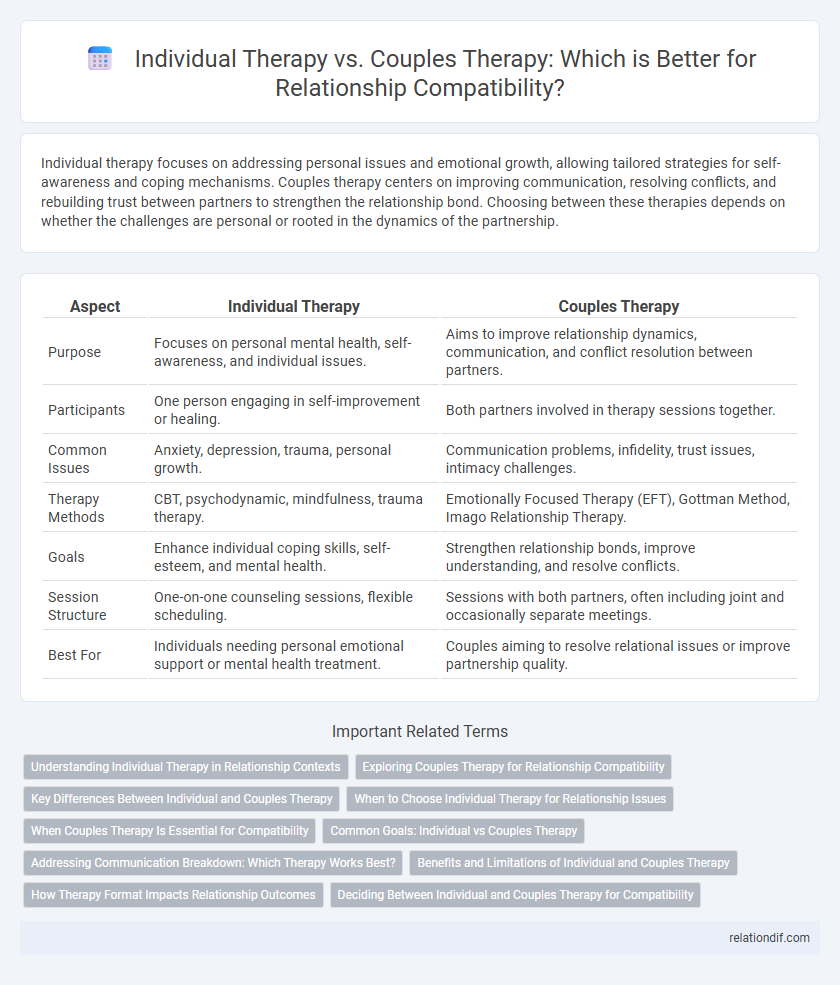Individual therapy focuses on addressing personal issues and emotional growth, allowing tailored strategies for self-awareness and coping mechanisms. Couples therapy centers on improving communication, resolving conflicts, and rebuilding trust between partners to strengthen the relationship bond. Choosing between these therapies depends on whether the challenges are personal or rooted in the dynamics of the partnership.
Table of Comparison
| Aspect | Individual Therapy | Couples Therapy |
|---|---|---|
| Purpose | Focuses on personal mental health, self-awareness, and individual issues. | Aims to improve relationship dynamics, communication, and conflict resolution between partners. |
| Participants | One person engaging in self-improvement or healing. | Both partners involved in therapy sessions together. |
| Common Issues | Anxiety, depression, trauma, personal growth. | Communication problems, infidelity, trust issues, intimacy challenges. |
| Therapy Methods | CBT, psychodynamic, mindfulness, trauma therapy. | Emotionally Focused Therapy (EFT), Gottman Method, Imago Relationship Therapy. |
| Goals | Enhance individual coping skills, self-esteem, and mental health. | Strengthen relationship bonds, improve understanding, and resolve conflicts. |
| Session Structure | One-on-one counseling sessions, flexible scheduling. | Sessions with both partners, often including joint and occasionally separate meetings. |
| Best For | Individuals needing personal emotional support or mental health treatment. | Couples aiming to resolve relational issues or improve partnership quality. |
Understanding Individual Therapy in Relationship Contexts
Individual therapy in relationship contexts focuses on personal growth, emotional regulation, and self-awareness, which can significantly improve communication and conflict resolution within partnerships. This form of therapy allows individuals to explore personal patterns and trauma that impact their relationships, fostering healthier interactions and emotional connection. By addressing individual issues first, therapy supports more effective couple dynamics and long-term relationship satisfaction.
Exploring Couples Therapy for Relationship Compatibility
Couples therapy offers a structured environment to explore relationship compatibility by addressing communication patterns, emotional intimacy, and conflict resolution strategies. Therapists guide couples in identifying core values, expectations, and behavioral tendencies that impact mutual understanding and connection. This process helps partners develop tailored coping mechanisms and shared goals, enhancing overall compatibility and long-term relational satisfaction.
Key Differences Between Individual and Couples Therapy
Individual therapy centers on personal growth, emotional healing, and self-awareness, addressing issues specific to one person's experiences and mental health. Couples therapy targets relationship dynamics, communication patterns, and conflict resolution between partners, aiming to improve intimacy and mutual understanding. The key difference lies in the therapeutic focus: individual therapy prioritizes personal development, while couples therapy concentrates on relational compatibility and joint problem-solving.
When to Choose Individual Therapy for Relationship Issues
Individual therapy is ideal for addressing personal issues such as anxiety, depression, or self-esteem that impact relationship dynamics. It provides a focused environment to explore one's emotions and behaviors without the influence of a partner. Choose individual therapy when personal growth, self-awareness, or coping skills development are the primary goals within the context of relationship challenges.
When Couples Therapy Is Essential for Compatibility
Couples therapy is essential for compatibility when partners face persistent communication challenges, unresolved conflicts, or differing emotional needs that individual therapy cannot address alone. It facilitates collaborative problem-solving and emotional understanding to strengthen relational bonds. Engaging in couples therapy helps identify incompatible patterns and develop strategies that align both partners' goals for a harmonious partnership.
Common Goals: Individual vs Couples Therapy
Individual therapy centers on personal growth, emotional regulation, and self-awareness, targeting specific mental health challenges unique to one person. Couples therapy prioritizes relationship dynamics, communication improvement, and conflict resolution to foster mutual understanding and shared emotional intimacy. Both modalities aim to enhance well-being but align their goals with either singular self-improvement or dyadic relational harmony.
Addressing Communication Breakdown: Which Therapy Works Best?
Couples therapy specifically targets communication breakdowns by fostering dialogue, improving conflict resolution skills, and enhancing emotional connection between partners. Individual therapy helps one partner understand personal communication patterns and emotional triggers, promoting self-awareness that can benefit relational dynamics. For direct resolution of shared communication issues, couples therapy often proves more effective due to its focus on interaction and mutual understanding.
Benefits and Limitations of Individual and Couples Therapy
Individual therapy provides personalized attention tailored to a single person's emotional and psychological needs, promoting self-awareness and personal growth, though it may lack insight into relational dynamics. Couples therapy offers a structured environment for partners to improve communication and resolve conflicts together, enhancing relationship satisfaction but sometimes limiting individual expression. Both approaches have unique benefits and limitations, making the choice dependent on whether the primary focus is individual healing or relational improvement.
How Therapy Format Impacts Relationship Outcomes
Individual therapy enhances self-awareness and personal growth, which can indirectly improve relationship dynamics by fostering better communication and emotional regulation. Couples therapy directly targets interaction patterns, conflict resolution, and mutual understanding, leading to more immediate improvements in relationship satisfaction and stability. The choice between therapy formats significantly influences relationship outcomes by determining whether the focus is on personal development or shared relational issues.
Deciding Between Individual and Couples Therapy for Compatibility
Deciding between individual and couples therapy for compatibility depends on the relationship dynamics and personal goals. Individual therapy focuses on self-awareness and personal growth, which can improve communication and conflict resolution skills within the relationship. Couples therapy targets joint issues, promoting mutual understanding and collaborative problem-solving to enhance compatibility and relationship satisfaction.
Individual Therapy vs Couples Therapy Infographic

 relationdif.com
relationdif.com